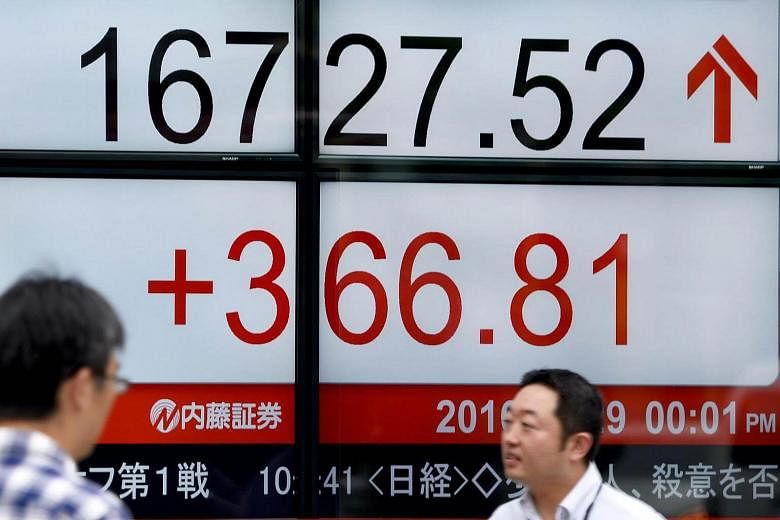SINGAPORE (BLOOMBERG) - Asian stocks outside Japan slid on Wednesday (Oct 5) on concern central banks will reduce stimulus, while the Topix index climbed after the yen weakened.
The MSCI Asia Pacific Excluding Japan Index fell 0.5 per cent to 454.28 as of 9.05am in Tokyo. South Korea's Kospi index lost 0.6 per cent, as did Australia's S&P/ASX 200 Index. New Zealand's S&P/NZX 50 Index fell 0.9 per cent.
The Topix added 0.2 per cent on Wednesday, bucking declines after the yen fell the most against the dollar in more than a month.
China's markets are shut for the remainder of the week, while those in Hong Kong have yet to start trading.
Bonds, currencies and stocks were shaken on Tuesday after Bloomberg News reported the European Central Bank is likely to gradually taper asset purchases as it ends quantitative easing, citing officials who asked not to be identified.
The odds the Federal Reserve will raise interest rates by December climbed to 61 per cent on Tuesday, from about 50 per cent a week earlier.
"The outlook for European data has stabilised somewhat recently, which is an encouraging sign; however, the argument for extending the stimulus programme further into 2017 remains stronger," Mr James Woods, a strategist at Rivkin Securities in Sydney, said by phone.
"If the Fed sees a continuing improvement in the data, they're going to hike in December. We're going to see increased volatility before that, especially with the US elections in November."
Investors are scouring the comments of central bankers for any hints of tightening. An informal consensus has built among policy makers in the past month that ECB asset buying will have to be tapered once a decision is taken to end the program, the euro-zone officials said. They didn't exclude that QE could still be extended past the current end-date of March 2017 at the full pace of €80 billion (S$122.97 billion) a month.
Meanwhile, Federal Reserve Bank of Richmond President Jeffrey Lacker urged the US central bank to raise interest rates to head off a likely pickup in inflation that would force bigger increases later.
Futures on the Hang Seng Index slipped 0.1 per cent in most recent trading. Hong Kong's benchmark index added 0.5 per cent on Tuesday.
A rally in Hong Kong equities that's made them the hottest in Asia is seen continuing through year-end, buoyed by increased access for mainland funds and a stabilising Chinese economy.
The Hang Seng Index jumped 12 per cent last quarter, its best performance since 2009, as flows through an exchange trading link with Shanghai swelled to a record. That was the biggest gain among Asian benchmark indexes tracked by Bloomberg.
The MSCI Asia Pacific Index rose 8.4 per cent last quarter, its largest such advance since early 2012. It is now up 6.3 per cent in 2016, helped by a recovery in oil after a turbulent start to the year.
Futures on the S&P 500 Index slipped 0.1 per cent. The underlying US equity benchmark index dropped 0.5 per cent on Tuesday following hawkish comments from Lacker and Federal Reserve Bank of Cleveland president Loretta Mester.

